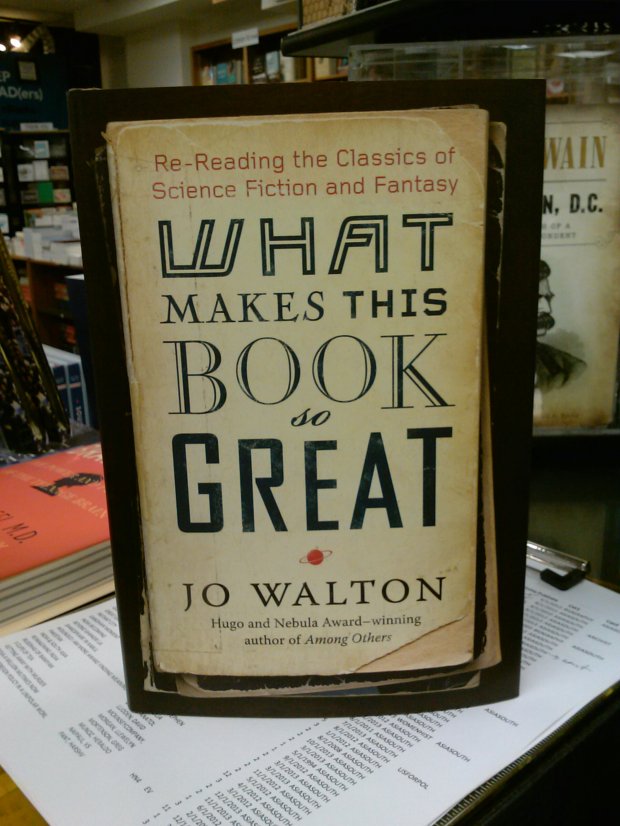 It’s been somewhat slow in terms of reading and writing here. It’s partly work, partly the fact that what Warren Ellis calls The Great Winter Hermitage is approaching again, and I seem to be saving all the reading and writing for times when I really won’t want to leave the house. My reading now, oddly enough, is done mostly while I’m out and about, as I am still in the non-fiction audio book phase. I did Dewey’s readathon last Saturday and finished listening to The Brain’s Way of Healing by Norman Doidge while doing a half-marathon through the park (way to overachieve, I say). Now I’m listening to Daniel Lieberman’s The Story of the Human Body, which is forcing me to learn quite a bit about something I oddly never particularly cared about, namely, various ancient hominids and what hunter-gatherers were up to. Lieberman is mainly interested in how evolution has affected our bodies and therefore our health. Spoiler alert: he thinks we should eat fewer donuts and walk more miles, but he also explains pretty well why it’s hard to overcome the impulse to sit on the couch instead. He makes a point that while we can ask what it is that the human body has evolved to do, we shouldn’t expect an easy, one-task answer. Much like we didn’t evolve to eat one kind of diet (he takes a few shots at modern paleo diets throughout the book). Whereas my previous audio read focused more on the brain, this one is more body-oriented (though I’m a few chapters away from the finish line).
It’s been somewhat slow in terms of reading and writing here. It’s partly work, partly the fact that what Warren Ellis calls The Great Winter Hermitage is approaching again, and I seem to be saving all the reading and writing for times when I really won’t want to leave the house. My reading now, oddly enough, is done mostly while I’m out and about, as I am still in the non-fiction audio book phase. I did Dewey’s readathon last Saturday and finished listening to The Brain’s Way of Healing by Norman Doidge while doing a half-marathon through the park (way to overachieve, I say). Now I’m listening to Daniel Lieberman’s The Story of the Human Body, which is forcing me to learn quite a bit about something I oddly never particularly cared about, namely, various ancient hominids and what hunter-gatherers were up to. Lieberman is mainly interested in how evolution has affected our bodies and therefore our health. Spoiler alert: he thinks we should eat fewer donuts and walk more miles, but he also explains pretty well why it’s hard to overcome the impulse to sit on the couch instead. He makes a point that while we can ask what it is that the human body has evolved to do, we shouldn’t expect an easy, one-task answer. Much like we didn’t evolve to eat one kind of diet (he takes a few shots at modern paleo diets throughout the book). Whereas my previous audio read focused more on the brain, this one is more body-oriented (though I’m a few chapters away from the finish line).
 I also just finished Sarah Ruhl’s 100 Essays I Don’t Have Time To Write. This is the perfect book if you don’t have time to read, either. As advertised, it has one hundred essays, Chekhovian in their brevity, but somehow containing within humor, profundity, life advice, and theatre critique all at once. Read this little book if you love theatre or if you hate theatre. Read it if you love children or don’t want any children around. Read it if you are a dramaturg, or if you have no idea what ‘dramaturg’ means. Just read it. It will either take you a couple of hours or weeks, depending on your reading speed and the number of children you have.
I also just finished Sarah Ruhl’s 100 Essays I Don’t Have Time To Write. This is the perfect book if you don’t have time to read, either. As advertised, it has one hundred essays, Chekhovian in their brevity, but somehow containing within humor, profundity, life advice, and theatre critique all at once. Read this little book if you love theatre or if you hate theatre. Read it if you love children or don’t want any children around. Read it if you are a dramaturg, or if you have no idea what ‘dramaturg’ means. Just read it. It will either take you a couple of hours or weeks, depending on your reading speed and the number of children you have.


